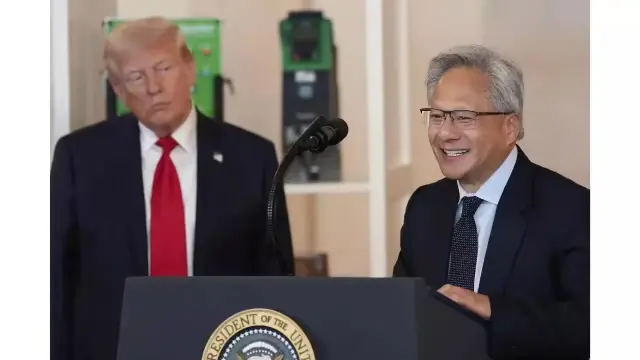October 3, 2025
Delays in Donald Trump’s UAE chip deal have left Nvidia CEO Jensen Huang frustrated, raising concerns about global chip supply chains and AI ambitions.

The much-anticipated semiconductor deal between the United States and the United Arab Emirates (UAE), championed by former U.S. President Donald Trump, has hit delays—causing growing frustration for Nvidia’s CEO Jensen Huang, whose company is deeply invested in the global chip industry.
The deal, originally announced as a strategic partnership to strengthen UAE’s chipmaking capabilities and boost AI innovation, was touted as a cornerstone of Trump’s economic and foreign policy. However, implementation has stalled due to regulatory concerns, logistical challenges, and geopolitical tensions.
The proposed agreement was designed to enable the UAE to develop state-of-the-art semiconductor manufacturing facilities, supported by partnerships with American firms. Trump had promoted the initiative as a win-win for both countries: expanding U.S. influence in the Middle East while reducing global dependency on East Asian supply chains dominated by Taiwan and South Korea.
Nvidia, as the world’s leading maker of AI accelerators and GPUs, was expected to play a critical role in supplying advanced chip technologies and expertise to the project. For Nvidia’s CEO Jensen Huang, the UAE initiative was a strategic opportunity to expand into new markets while supporting a diversification of global chip production.
Despite the initial fanfare, progress on the deal has been slow. According to insiders, several factors are contributing to the hold-up:
Regulatory hurdles: U.S. government agencies are scrutinising export controls and security implications of sharing advanced chip technologies with the UAE.
Geopolitical tensions: Washington’s broader competition with China over semiconductor dominance has made policymakers wary of new international deals that could complicate alliances.
Supply chain issues: Global shortages in manufacturing equipment, along with rising costs, are delaying infrastructure development.
Strategic disagreements: Reports suggest differing priorities between U.S. and UAE negotiators over the scale, scope, and governance of the partnership.
For Jensen Huang, the delays are particularly problematic. Nvidia has become a central player in the global AI boom, but it faces unprecedented demand pressures. With AI adoption accelerating worldwide, access to diversified chip production hubs like the UAE is crucial for meeting customer needs.
According to reports, Huang has privately expressed concern that bureaucratic and political roadblocks are undermining both Nvidia’s growth opportunities and broader U.S. technological leadership.
Industry analysts note that Huang has been vocal about the need to “democratise access to chips”, warning that bottlenecks in supply risk stalling global innovation in AI, autonomous vehicles, and cloud computing.
The UAE deal was seen as part of a larger effort to reshape the global semiconductor map, reducing overreliance on Taiwan, whose chip plants are vulnerable to geopolitical instability. If delays continue, the U.S. risks losing momentum to rivals like China, which is rapidly investing in domestic chip capacity.
The UAE, for its part, has emphasised its commitment to diversifying its economy beyond oil and establishing itself as a technology hub for the Middle East. The semiconductor deal remains a linchpin in those ambitions, but setbacks could dampen investor confidence and slow progress.
For Trump, who has promoted the deal as proof of his ability to strike bold international agreements, the delays carry political risks. His administration framed the partnership as both an economic and strategic victory, strengthening ties with a key Gulf ally. Critics now argue that the faltering implementation highlights the challenges of translating grand announcements into lasting outcomes.
The delays in Trump’s UAE chips deal highlight the complex interplay of technology, politics, and global supply chains. For Nvidia CEO Jensen Huang, they represent a missed opportunity to expand semiconductor access and meet soaring global demand.
As Washington, Abu Dhabi, and industry leaders work to resolve the outstanding hurdles, the deal’s future remains uncertain. Its success—or failure—could have far-reaching consequences for the future of AI, global chip supply security, and the balance of technological power.